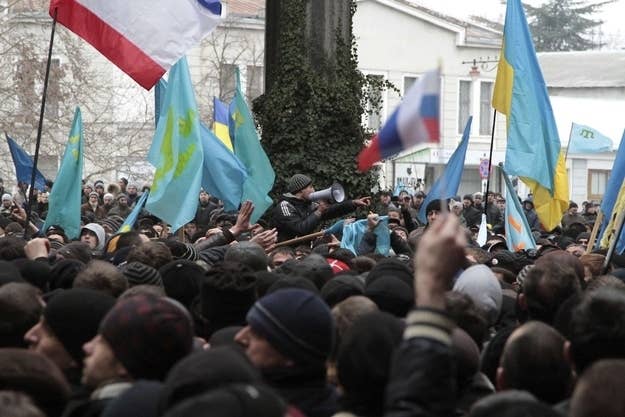
SIMFEROPOL, Ukraine — Fights broke out in the Crimean capital on Wednesday between demonstrators for and against Ukraine's new provisional government in Kiev. The Kremlin ordered unannounced war games in western Russia. By the looks of it, a Russian military intervention on behalf of ethnic Russians living in Ukraine seemed more likely than ever.
On the ground in Simferopol, however, the situation is rather different. The explosive atmosphere of the past days has been defused, not exacerbated. And the chance that Crimea, a former Russian possession, will split off and appeal for President Vladimir Putin's protection is smaller today than it has been in days past.
The phantom of Crimean separatism has spooked Ukraine since the country's independence from the Soviet Union in 1991. Crimean and Russian politicians alike have found populist gain in the notion of the Black Sea peninsula finally coming home to Mother Russia. But it seems nobody is ready to push as far as secession, since the status quo is much more beneficial to both the local pro-Russia lobby and Kremlin geostrategists.
From afar, the scuffles outside the Crimean parliament looked like a brewing storm between Russian nationalists on the one side and Ukraine loyalists — including Crimea's ethnic Tatar minority — on the other. In fact, the leaders of the two sides are in constant contact with each other and have a common enemy: the outsiders whom ousted President Viktor Yanukovych installed from his eastern Ukrainian stronghold in the city of Donetsk.
"Separatism is just a show," said Lenur Yunusov, editor of the Simferopol news site 15minut.org. "The fight for political posts and getting rid of the guys from Donetsk are much more important."
Refat Chubarov, the head of the Crimean Tatar community, and Sergei Aksyonov, leader of the Russian Unity Party, appeared together outside the regional parliament on Wednesday and called for calm. Both were marginalized by the old regime. Both support Ukraine's territorial integrity.
Crimea's independence is the last thing pro-Russia politicians want, Yunusov said: "For them it's better to be in Ukraine and get money from Moscow. They don't want to split off."
By bringing out thousands of men, many with the physiques of wrestlers, the well-organized Tatar community convinced the parliament to cancel a special session that could have discussed a referendum on Crimean independence.
Now representatives of Crimea's three biggest ethnic groups — Russians, Ukrainians, and Tatars — will sit down and negotiate the formation of a new regional government, said Liliya Muslimova, Chubarov's spokeswoman.
Fisticuffs and bloody noses appeared unavoidable as pro-Kiev protestors pushed through a spindly police line to a considerably smaller pro-Moscow rally.
Protesters chanting "Russia! Russia!" were surprisingly incoherent about what they really wanted. The most frequent answer to the question of whether Crimea should break off and become a part of Russia was that Ukraine should join the Moscow-led Customs Union and not the European Union. The Customs Union, consisting of Russia, Kazakhstan, and Belarus, is the Kremlin's latest plan to stand up to the West and create a regional powerhouse of its own.
There was little nationalistic fervor among the pro-Russia protestors. The Tatars, who are Muslim, were not targeted because of their ethnicity or religion — but because of their unequivocal support for the new authorities in Kiev, whom the Kremlin has branded fascists.
By conducting military exercises close to Ukraine's border, Putin is giving the finger to the interim government and its western allies, without facing any consequences. The Kremlin understands perfectly well that keeping a naval base in Crimea is much more useful than annexing the entire peninsula, since it is Ukraine's most vulnerable part.
Crimea, which dangles into the Black Sea, is often called "the balls of Ukraine," because whenever Russia needs to, it can give a tight squeeze. In the long run, squeezing is more effective than castration.
Officially, the Kremlin considers the provisional government in Kiev illegitimate. Yet Yanukovych's whereabouts remain unknown, though rumors persist he may be in Crimea. It's plausible that he is hiding at the Russian Navy base in Sevastopol — a sort of diplomatic no-man's-land like the Moscow airport transit lounge that was National Security Agency defector Edward Snowden's temporary refuge last summer.
As long as Yanukovych isn't found, the Kremlin can continue to pretend he's still Ukraine's president.
Russia's cautiousness in making any rash moves over Crimea was evident Tuesday, when Russian lawmaker Leonid Slutsky visited Simferopol. A member of nationalist firebrand Vladimir Zhirinovsky's party, Slutsky pussyfooted around the question of what Russia would actually do for Crimea's ethnic Russians.
"In the case of any provocations against the inhabitants in the east and southeast of Ukraine, and the Republic of Crimea, we also have corresponding, appropriate measures," he declared stiffly, while members of the local Russian community begged him for financial aid and complained that Moscow TV channels were ignoring them.
As demonstrators from both sides gradually dispersed from the Crimean parliament this afternoon, an older Russian woman started wailing that a man had been killed.
Like everything else here, there was a kernel of truth.
A man had in fact died — of a heart attack.
